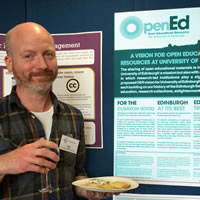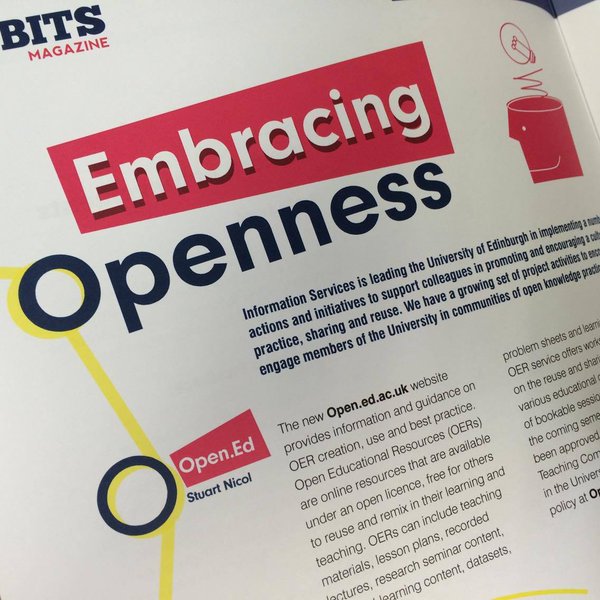The range of initiatives and involvement of staff and students across the University are part of what has been described as the development of an “open culture” at Edinburgh. This case study describes some of the drivers, open practices at Edinburgh and initiatives that contribute to this and compliments Creating a Culture of Open: University of Edinburgh.
Developing a meaning of Openness
Discussions on open access, open courseware and MOOCs had been taking place over several years at Edinburgh, and open education has “…always been taken seriously.” There was a strong mandate for openness from the Edinburgh University Student Association (EUSA) with the Vice President of Academic Affairs (VPAA) at the time, Alex Munyard, advocating for this issue and representing the student body on the Senate level Learning and Teaching Committee:
There were different drivers, there was the MOOC stuff happening as a special project, and there was always discussion around OER. But then there was another driver coming from the student body … the VPAA 3 years ago had brought a mandate, he was looking at open … he had this ‘open access’ paper and his thought was two fold.
One driver was about opening up all courses in the University so all students could see all courses … and the other driver seemed to be around a reputational thing for the University, that he was mentioning MIT OpenCourseWare and that the University should be seen to be opening up the courses…
You can find out more about EUSA’s campaign for open on the EUSA campaign page.
In moving to create the structure for an “open culture” at Edinburgh one challenge was to raise awareness of open education and OER. In tandem with raising awareness and providing different types of support for students and educators there also needed to be clearer understanding of what current perceptions of OER and open education were and what open education could potentially mean within the University’s own context.
In practice this meant re-orientating and developing the prevailing conversation away from Massive Open Online Courses (MOOC) to a broader remit: “…support for OER and I think general knowledge of, and understanding of, OER is much less developed within the university…” With this in mind, during 2015 and early 2016 work focused on:
… try[ing to]… develop an understanding of what we mean by open educational resources and what support for that would look like … people think different things of open educational resources, there’s not a consistent definition in people’s heads… OER and MOOCs are conflated...
Moreover understanding what an ‘open culture’ would look like involved acknowledging the shifting nature of openness and broadly contextualising it beyond the perception that it should be a particular department or unit (such as the library’s) concern:
I think OER is another aspect of teaching and research practice. That’s the business of HE, and it’s the business of FE … of education; I think it’s not to see it as something other. And also that it’s gradual as well. It evolves. And the important thing is to evolve with it.
As Stuart explains below, acknowledging the fluidity and situatedness of openness was reflected in how Edinburgh developed its OER policy.
Policy and Practice: Developing Edinburgh’s OER Policy
Edinburgh’s OER policy was developed from University of Leeds OER policy and presented to the Learning and Teaching committee in January 2016. Meanwhile Glasgow Caledonian University (GCU) were also developing their own OER policy (read more in the case study) and reviewing GCU’s policy also contributed to further developing the Edinburgh OER policy:
And what I did was take the best changes that I thought from the Glasgow Caledonian one [policy] and the Greenwich one and then through discussions with Lorna [Campbell] and Melissa [Highton] we kind of added our own bits into it as well … and I think the main thing that was added from our perspective is the definition about OERs … it’s a much more active definition of OER, there’s the educational part – what is an educational resource? – it’s through the act of teaching that it becomes an educational resource…
As Stuart noted the process has not only been gradual but also specific to Edinburgh because “every institution is slightly different…” It is also an “evolving” situation and is responsive to the needs of the University:
The policy is there to serve a purpose in the background. The policy is not the driver, the driver is the change in practice and that change in practice maybe isn’t as major as we think. The change in practice is the digital literacy thing around open licensing.
Edinburgh’s policy is flexible and does not “mandate”. The policy encourages the use of open licenses and suggests appropriate online spaces (such as Edinburgh’s Media Hopper):
… the policy is an enabling policy and it’s not like we’re mandating people to share things, there’s good reasons not to share things. What we’re doing is trying to put the structures in place for people who do want to do this; to make it clear that the University is behind them in doing it and that there’s a policy there to say actually the University is encouraging people to do this.
Supporting Open Education at Edinburgh
… a lot of people are actually doing this anyway. It’s almost like OER isn’t a thing, it’s not like a separate activity you engage in, actually these people are doing public engagement with knowledge, they want to take their knowledge and share it…
Stuart described how there were many lecturers at Edinburgh already sharing their resources online but that they were doing so without using an open license, which would enable them to specify attribution and permissions for reuse. In addition, promoting open licensing amongst staff and students addresses “restrictive copyright” and enables reuse of material: “ultimately that’s the problem we’re trying to free people up from.”
One example is Professor Clive Greated, a member of the School of Physics and Astronomy at University of Edinburgh. He had been creating his own videos and sharing them on YouTube, receiving hundreds of thousands of views. Whilst the videos weren’t openly licensed originally Clive was happy to openly license material once he became aware of it. As Stuart noted: “we find a lot of people like that, that are one step away from creating OERs…”
Stuart and his team identify educators already sharing material and let them know about the potential of open licensing. The OER service also provides support and information to educators and students about OER and open education. In addition Edinburgh’s open.Ed site (“a place to point people to”) provides the place to go to find such resources, whilst showcasing OER from around the university and therefore potentially giving greater visibility to an open resource. You can read more about Edinburgh’s open.Ed site and the three strands that shape and inform engagement in Creating a Culture of Open: University of Edinburgh.
… it’s the impact that you can potentially have by being enthusiastic and communicating your subject, I think that’s the message that we want to get out there…
I’d hope, over time, as more people start to do this and start to see the benefits, and other academics see their colleagues getting benefits out of this, then that is how they’ll be convinced.
What next?
As Edinburgh continues to develop its “open culture” Stuart described some of their forthcoming plans which include “consolidating the service … engagement events around the university …” as well as thinking more closely about whether there is a need for an OER repository and looking at different channels (such as Flickr) for disseminating open resources.
There are also wider questions that the open community needs to address and which Edinburgh are also reflecting on, for example the “…question about tracking and figuring out what the impact [of OER] has been” remains an issue.
Read Creating a Culture of Open: University of Edinburgh
Photo credits: Used with permission
Originally published on 27 July 2016 - 3:42pm • by Beck Pitt




